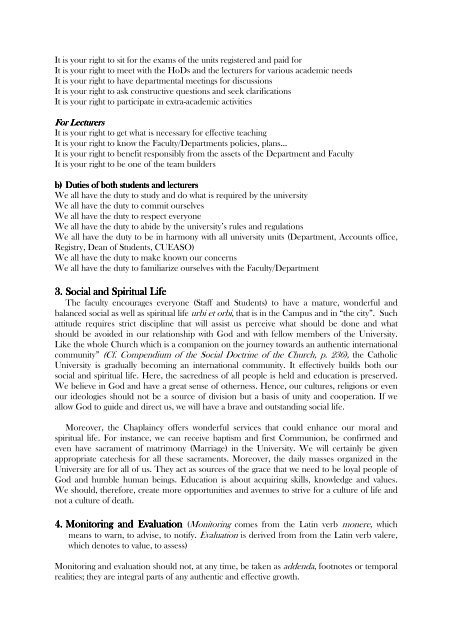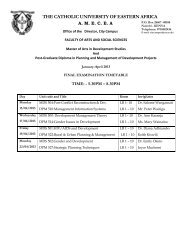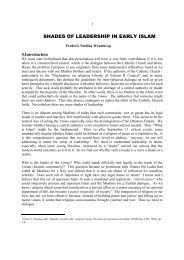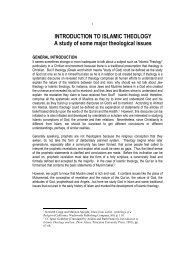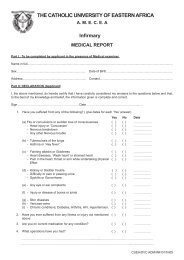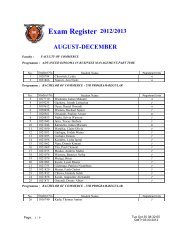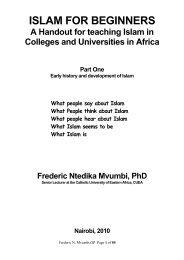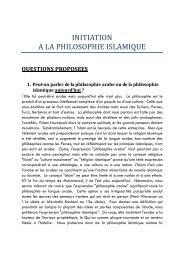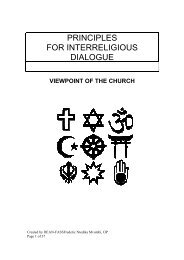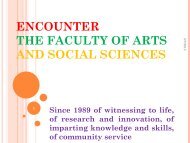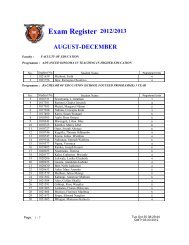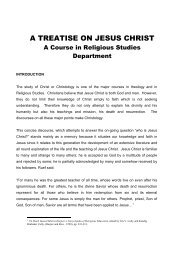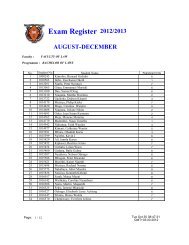FASSC PROFILE.pdf - CUEA
FASSC PROFILE.pdf - CUEA
FASSC PROFILE.pdf - CUEA
Create successful ePaper yourself
Turn your PDF publications into a flip-book with our unique Google optimized e-Paper software.
It is your right to sit for the exams of the units registered and paid for<br />
It is your right to meet with the HoDs and the lecturers for various academic needs<br />
It is your right to have departmental meetings for discussions<br />
It is your right to ask constructive questions and seek clarifications<br />
It is your right to participate in extra-academic activities<br />
For Lecturers<br />
It is your right to get what is necessary for effective teaching<br />
It is your right to know the Faculty/Departments policies, plans…<br />
It is your right to benefit responsibly from the assets of the Department and Faculty<br />
It is your right to be one of the team builders<br />
b) Duties of both students and lecturers<br />
We all have the duty to study and do what is required by the university<br />
We all have the duty to commit ourselves<br />
We all have the duty to respect everyone<br />
We all have the duty to abide by the university’s rules and regulations<br />
We all have the duty to be in harmony with all university units (Department, Accounts office,<br />
Registry, Dean of Students, <strong>CUEA</strong>SO)<br />
We all have the duty to make known our concerns<br />
We all have the duty to familiarize ourselves with the Faculty/Department<br />
3. Social and Spiritual Life<br />
The faculty encourages everyone (Staff and Students) to have a mature, wonderful and<br />
balanced social as well as spiritual life urbi et orbi, that is in the Campus and in “the city”. Such<br />
attitude requires strict discipline that will assist us perceive what should be done and what<br />
should be avoided in our relationship with God and with fellow members of the University.<br />
Like the whole Church which is a companion on the journey towards an authentic international<br />
community” (Cf. Compendium of the Social Doctrine of the Church, p. 236), the Catholic<br />
University is gradually becoming an international community. It effectively builds both our<br />
social and spiritual life. Here, the sacredness of all people is held and education is preserved.<br />
We believe in God and have a great sense of otherness. Hence, our cultures, religions or even<br />
our ideologies should not be a source of division but a basis of unity and cooperation. If we<br />
allow God to guide and direct us, we will have a brave and outstanding social life.<br />
Moreover, the Chaplaincy offers wonderful services that could enhance our moral and<br />
spiritual life. For instance, we can receive baptism and first Communion, be confirmed and<br />
even have sacrament of matrimony (Marriage) in the University. We will certainly be given<br />
appropriate catechesis for all these sacraments. Moreover, the daily masses organized in the<br />
University are for all of us. They act as sources of the grace that we need to be loyal people of<br />
God and humble human beings. Education is about acquiring skills, knowledge and values.<br />
We should, therefore, create more opportunities and avenues to strive for a culture of life and<br />
not a culture of death.<br />
4. Monitoring and Evaluation (Monitoring comes from the Latin verb monere, which<br />
means to warn, to advise, to notify. Evaluation is derived from from the Latin verb valere,<br />
which denotes to value, to assess)<br />
Monitoring and evaluation should not, at any time, be taken as addenda, footnotes or temporal<br />
realities; they are integral parts of any authentic and effective growth.


